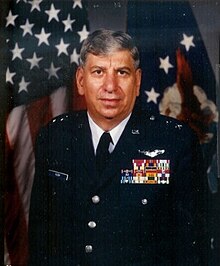Jacques Paul Klein
After five years of Nazi occupation and the death of Klein's father; and the destruction of the family home and business at the end of World War II, his mother opted to move to the United States with her seven-year-old son, arriving on December 7, 1946.
She pursued a professional career as a college instructor and subsequently served as a staff associate in the Division of Physics and as a program director at the National Science Foundation in Washington, D.C.
[This quote needs a citation] In 2011 he was awarded the Degree of Doctor Honori Causa by the Josip Juraj Strossmayer University and Certificate of Gratitude by the Association of Returnees of Croatia and the Distinguished Global Leadership Award by the Evandeoski Teoloski Fakultet in Osijek, Croatia, "for being a transformational leader who demonstrated clarity of vision, moral conviction and the political will while championing human rights and the development of democracy in Croatia, Bosnia Herzegovina and Liberia" [This quote needs a citation].
Klein was commissioned through Officer Training School, Lackland Air Force Base, Texas, in August 1963, and was assigned to the 366th Tactical Fighter Wing, Holloman Air Force Base, New Mexico, as deputy director of personnel, and subsequently served as chief of the Quality and Career Control Branches.
During that assignment, he earned his officer non-rated aircrew member wings flying intelligence, strike and reconnaissance missions in 0-1 Es with the 21st Tactical Air Support Squadron.
In January 1968, upon release from active duty to resume graduate studies, Klein accepted a reserve assignment with the Office of Special Investigations, District 24 in Chicago, Illinois.
In June 1982, he was assigned as mobilization assistant to the chief, Policy and Management Division, Directorate of International Programs, Air Staff.
In January 1991, Klein was recalled to active duty for a short period of time during the Gulf War and retired to civilian life at the end of the conflict.
Ambassador Klein was a career member of the Senior Foreign service of the United States with the rank of minister counselor.
He was subsequently posted abroad to serve as consular officer at the American consulate general in Bremen, Federal Republic of Germany.
He returned overseas in 1975 upon assumption of diplomatic relations with the German Democratic Republic, to serve as consular officer in the newly opened American embassy in Berlin.
In 1993 he was again posted abroad, to serve as political adviser to the commander-in-chief of the United States European Command in Stuttgart, Germany.
In 1996, United Nations Secretary-General Boutros Boutros-Ghali selected Klein to serve as transitional administrator for Eastern Slavonia, Baranja and Western Sirmium (UNTAES), with the rank of Under-Secretary-General.
In light of the above considerations, the Panel unanimously recommended that Appellant: (a) be issued a letter of apology from OIOS for having allowed Appellant's name to be tarnished and his reputation sullied by unproven accusations and; (b)be awarded compensatory damages in the amount of one year's net salary plus interest at the prevailing rate for the violations of his due process.
Additionally, it is apparent to the Tribunal that any reasonable person would inevitably suffer serious anxiety and emotional distress if put through the same ordeal... the Respondent's failure to reasonably exercise the discretion to withhold or modify the procedurally flawed document resulted in "a serious personal and professional blight on the Applicant's character.
Having given due and careful consideration to both parties' submissions and the record, the Tribunal finds that the Applicant should be compensated by an award of US60,000 for emotional distress and anxiety suffered by him as a result of the Respondent's actions, as well as for the damage caused his reputation.






